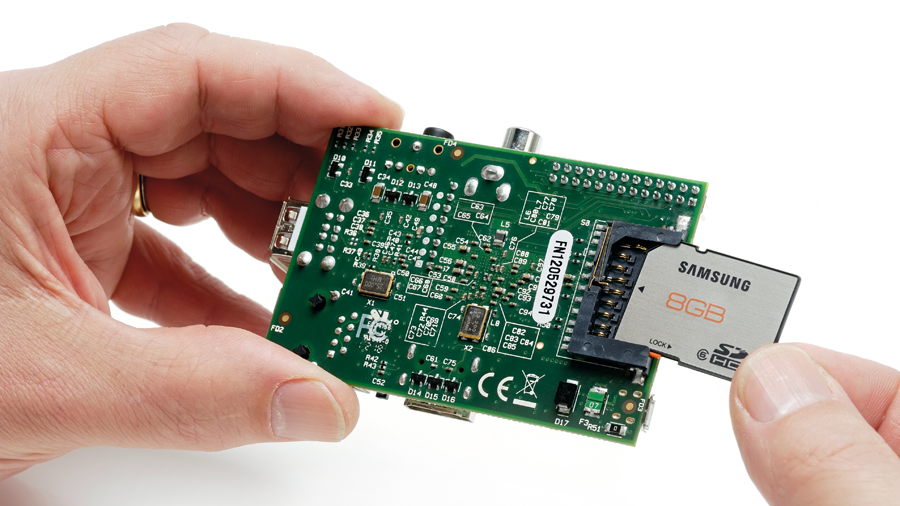Raspberry Pi: the hidden business benefits
A mini-computer made for schools, used by business

Conceived by a registered charity, the £25 mini-computer Raspberry Pi was developed for children to learn how to program. But since its debut last year it's made waves in other sectors, and the Raspberry Pi Foundation is aiming to see the customisable computers everywhere.
A side effect has been a multitude of uses for smaller businesses, which can take advantage of capabilities that might otherwise have seemed out of their reach.
Raspberry Pi is now going into mass production through licensed manufacture deals with Premier Farnell's Element14 and RS Electronics, and small businesses are buying the miniature device along with the schools and hospitals it was originally aimed at.
The computer, which costs $35 (£23) - or $25 (£16.50) without Ethernet - is a complete 700 MHz ARM CPU with a GPU and 256MB of RAM, using an SD card as a hard drive. It has two USB ports, Ethernet and audio as well HDMI at 1080p.
Well supported
Raspberry Pi comes well supported. The Foundation provides Debian and Arch Linux ARM distributions to download, while the Pi Store opened in December last year, allowing users to download a range of apps, development tools, media programs and tutorials.
Back in 2006, the founders of Raspberry Pi had noticed that most young IT professionals had only done a little web design, in contrast to the boom in the skills seen in the 1990s. At the same time, computers had become too expensive for experimental programming.
In 2008, processors designed for mobile devices became more affordable. Now powerful enough to provide multimedia, they were attractive to those who wouldn't be interested in a device purely for programming.
Are you a pro? Subscribe to our newsletter
Sign up to the TechRadar Pro newsletter to get all the top news, opinion, features and guidance your business needs to succeed!
The Raspberry Pi team partnered with Pete Lomas, MD of hardware design and manufacture company Norcott Technologies, and David Braben, co-author of BBC Micro game Elite, to form today's Raspberry Pi Foundation.
Raspberry Pi thinks of itself as a software company which provides the hardware, enabling smaller players to get into business. It can be used as a server to handle light traffic, such as that experienced by some SMBs, and programmers in small companies can use it as a basis for penetration testing of information security.
The device can be used to work out whether computer components are working or to resolve connectivity problems. It can control processes or be deployed as a low cost development platform for both software developers and network engineers. SMBs can also use Raspberry Pi as a dashboard for business intelligence.
Raspberry Pi in use
Warwickshire based Ambay Software, which develops and supports legal applications on iOS and Android, is using two of the devices between two different offices.
The firm's MD Nick Harrington has installed CrashPlan back up software and open source version control system Apache Subversion successfully on Raspberry Pi.
"Both of mine are running with 2+TB USB powered storage," he says. "This leads to a better understanding of related utilities like headless operation, PuTTY and WinSCP (file transfer to Raspberry P) or bringing Linux inside a Windows domain."
Harrington has also created some Hamacci virtual private networks (VPNs) to secure the firm's source libraries so that remote developers can get secure and safe code access.
Business applications
Businesses are also using Raspberry Pi for internal processes. Eben Upton, a chip architect at Broadcom and a founder of the Raspberry Pi Foundation, says the device is particularly useful in certain functions such as programming displays for digital signage.
"Raspberry Pi is cheap and the investment is the same as buying a keyboard," he says.
According to Upton, independent software vendors are doing well from buying Raspberry Pis in bulk from the exclusive resellers RS and Farnell and selling it on, particularly to digital signage companies.
"If we look at sales of the number of units, we are seeing uptake in people buying 10, 100 and 1,000, indicating that they are selling the platform on, or individual businesses are using it," he says.
Whereas only big companies could address sectors such as digital signage previously, those buying Raspberry Pi tend to be small businesses. Upton thinks it won't be long before the device is widely used for generic industrial and control processes - including digital signage and collecting data in a factory environment.
"It is actually very suitable for industrial uses, especially for industrial control processes," he says. "The Pi is as powerful or more powerful than what is currently being used."
The low cost computer is extremely customisable and for many businesses trying it out makes sense. SMBs need some technical expertise from an internal IT manager, programmer or consultant - or even an MD - but once Raspberry Pi is integrated, the device has many uses and advantages over elements of existing IT.
"It's not a whole new paradigm but you do have to learn some new stuff - and you lose little processing power," says Upton.
The mini-computer is likely to have a big unintended impact in the SMB sector.
Raspberry Pi isn't for everyone, but it could certainly benefit many smaller businesses in sectors such as digital signage and the software space.